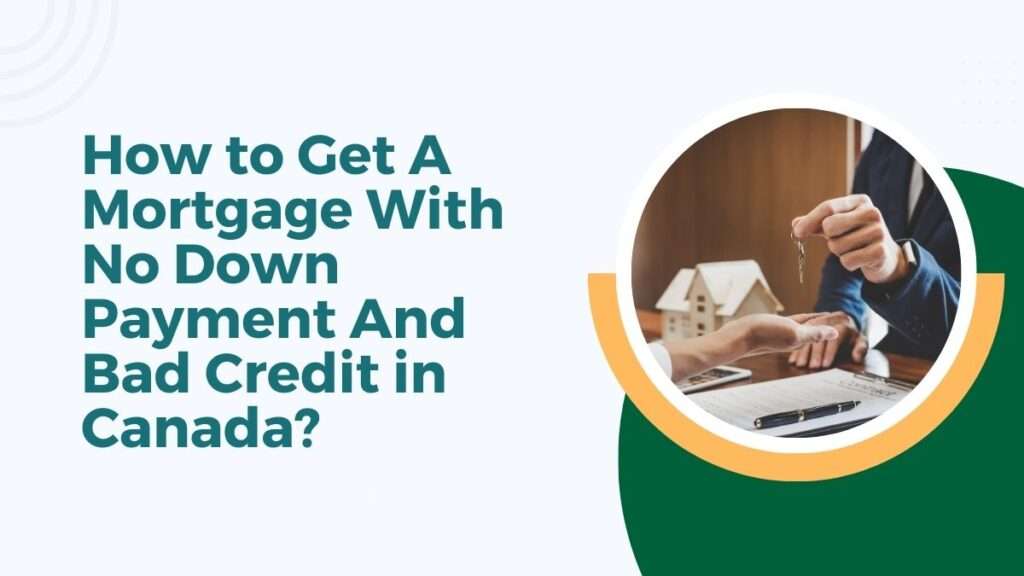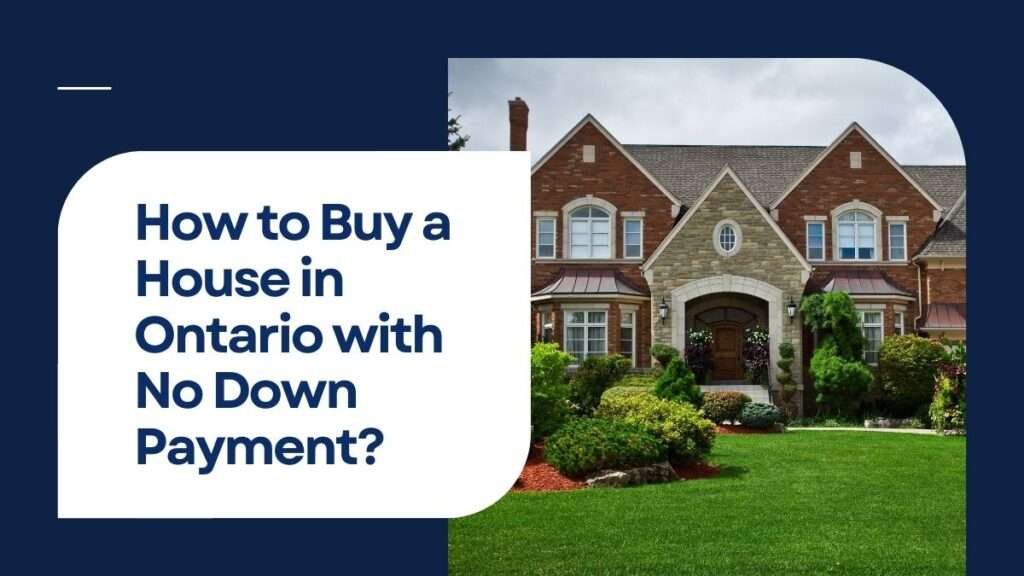Dreaming of Homeownership in Canada? Learn how to get a mortgage with no down payment and bad credit in Canada.
Are you dreaming of owning a home in Canada but struggling with bad credit and no down payment? You’re not alone. Many Canadians face these challenges, but that doesn’t mean homeownership is out of reach.
There are options available that can help you secure a mortgage, even if you have a low credit score or haven’t saved enough for a down payment. In this guide, we’ll walk you through practical strategies, government programs, and lender options that can improve your chances of getting approved for a mortgage.
Whether you’re a first-time homebuyer or looking to get back on track, these tips can help you move one step closer to owning your dream home.
How to Get A Mortgage With No Down Payment And Bad Credit in Canada?
Discover how to secure a mortgage in Canada with no down payment and bad credit, and take the first step toward homeownership!
Improving Your Credit Score
Your credit score plays a big role in getting a mortgage and the interest rate you’ll pay. A higher credit score usually means a lower interest rate, saving you money in the long run.
How to improve your credit score?
Pay your bills on time
Missing a payment can hurt your credit score. Make sure you pay all your bills like credit cards, loans, and utilities on time.
Example: Sarah forgot to pay her credit card bill once, and it caused her score to drop by 50 points. She set up automatic payments so she wouldn’t miss any more bills. Over time, her score started to go back up.
Pay down debt
Focus on paying off high-interest debts first, like credit cards. Reducing your debt lowers your overall credit utilization and helps raise your score.
Example: Tom had several credit card balances, but he focused on paying off the one with the highest interest rate. After a few months, he paid it off and his credit score went up.
Check for mistakes on your credit report:
Sometimes there are errors on your credit report that hurt your score. Make sure everything is accurate.
Example: Emily checked her credit report and found an old, incorrect bill listed. She disputed it, and it was removed. Her score improved after that.
Avoid opening new credit accounts:
When you apply for new credit cards or loans, it can temporarily lower your credit score. If you’re trying to improve your score, avoid new credit.
Example: Jason wanted a new credit card for rewards but noticed his credit score dropped after applying. He decided to hold off on applying for new cards until his score improved.
Tip: If you’re planning to buy a home soon, start working on your credit at least 6 months to a year in advance.
Government Programs for Down Payments
There are government programs that can help you save for your down payment, especially if you’re a first-time homebuyer.
First-Time Home Buyer Incentive
The government can help with 5% or 10% of your home’s price for your down payment. You repay it when you sell or refinance your home.
Example: Alex bought his first home with the help of the First-Time Home Buyer Incentive. The government gave him 10% for the down payment, which lowered his upfront costs.
Home Buyers’ Plan (HBP)
You can withdraw up to $35,000 from your RRSP (retirement savings) for your down payment. Just make sure to pay it back within 15 years.
Example: Lisa used $30,000 from her RRSP to help with her down payment. It helped her buy a home without draining her savings.
Tip: Check for other local programs in your area that could help with the down payment.
Lender Programs for Flexible Down Payments
Some lenders offer more flexible down payment options, especially if you don’t have a lot saved up.
No Down Payment Mortgages
Some lenders offer no down payment mortgages, where they help cover the down payment. However, these often come with higher interest rates.
Example: Mike couldn’t afford a down payment, but a lender offered him a mortgage with no down payment. His interest rate was higher, but it allowed him to buy a house.
Low Down Payment Mortgages
Many banks allow you to buy a home with as little as 5% down. Even if your credit score isn’t perfect, you might still qualify.
Example: Rachel was able to get a mortgage with only 5% down, even though her credit score wasn’t great.
Tip: Shop around for different lenders to find the best down payment options for your situation.
Shared Equity Mortgages
A shared equity mortgage is when someone else (like an investor or lender) helps you with the down payment in exchange for a share in your home’s value.
How it works
You get help with your down payment, and in return, the lender or investor gets a portion of your home’s value when you sell it.
Example: John didn’t have enough saved for a down payment, so he used a shared equity mortgage. The lender helped him with 10% of the down payment, and when John sold the house, they split the profit.
Tip: Be sure to understand the terms of the deal before agreeing, so you know how much you’ll owe and how much the other party will get when you sell.
Gift Letters from Family and Friends
If your family or friends are willing to help, they can give you money for your down payment. This is allowed, but they’ll need to write a gift letter confirming that the money is a gift, not a loan.
How it works?
The gift giver writes a letter stating that the money is a gift and not something you need to pay back. You’ll need to show proof of the transaction.
Example: Anna’s parents gave her $15,000 for her down payment. They wrote a gift letter saying the money was a gift. Anna used the money to secure a mortgage and buy her home.
Tip: Double-check with your lender about their requirements for the gift letter to make sure it’s written correctly.
Mortgage Brokers: How They Can Help
A mortgage broker helps you find the right lender for your needs, especially if you’re having trouble getting approved due to low credit or a small down payment.
How they help?
Access to many lenders: Brokers have connections with different lenders, including ones that specialize in helping people with bad credit.
Expert advice: They can explain your options and find you the best deal.
Example: Sarah worked with a mortgage broker who found a lender that would approve her despite her low credit score. Without the broker, she might have been denied.
Tip: Ask about any fees the broker may charge. Some brokers charge fees, while others are paid by the lender.
Consult with a Mortgage Professional
A mortgage professional can help guide you through the process of applying for a mortgage.
How they help?
They explain mortgage options and help you understand the details, like interest rates and fees.
Example: Mark spoke with a mortgage professional who explained all the terms of his mortgage. This helped him avoid any surprises and made the process easier.
Tip: Don’t hesitate to ask questions. Mortgage professionals are there to help you make the right decisions.
Be Patient and Persistent
Saving for a down payment and improving your credit score takes time, but it’s worth it in the end.
How to stay motivated?
Set small, realistic goals: Break your down payment goal into smaller chunks, like saving $100 a month or paying off one credit card.
Track your progress: Keep track of how much you’ve saved and how your credit score improves.
Example: Emma started saving $200 a month and monitored her credit score. After a year, she had enough for her down payment, and her credit score had gone up.
Tip: Stay focused and patient, even if it takes longer than you hoped. Every small step counts.
Consider Renting to Own
Renting to own can be a good option if you’re not quite ready to buy but want to work toward homeownership.
How it works?
You rent a home, and part of your rent goes toward the down payment. This gives you time to save while living in the house.
Example: Lisa rented a home with a rent-to-own agreement. Each month, a portion of her rent went toward her down payment. After a couple of years, she had enough to buy the home.
Tip: Make sure you fully understand the terms of the rent-to-own contract before signing.
Common Questions About Getting a Mortgage in Canada
Top Mortgage Brokers in Canada Answer Your Common Questions: Simplifying the Path to Homeownership!
What is the minimum credit score for a mortgage in Canada?
The minimum credit score for a mortgage in Canada is typically 620-650 for most lenders. However, some lenders may accept lower scores, especially if you have a stable income or are applying for a government-backed mortgage program.
Can I buy a house with 0 down in Canada?
Yes, some lenders offer “no down payment” mortgages, though they are rare and often come with higher interest rates.
Can you get a mortgage in Canada without a credit score?
While it’s possible, it’s much harder. If you have no credit history, lenders may require additional documentation or higher down payments. Some government programs may still be available to assist.
Can you get a mortgage with debt in Canada?
Yes, having debt doesn’t automatically disqualify you from getting a mortgage, but it will affect how much you can borrow. Your debt-to-income ratio is a key factor in determining mortgage approval.
Real-Time Statistics on Mortgages in Canada
Real-Time Mortgage Statistics in Canada Insights from Top Brokerage Firms to Help You Make Informed Decisions!
Interest Rates: As of 2024, the Bank of Canada’s prime rate is 6.7%, which impacts mortgage rates.
Average Home Prices: The average home price in Canada as of mid-2024 is around $740,000, depending on the region.
Mortgage Delinquencies: Canada’s mortgage delinquency rate is currently around 0.3%, indicating a relatively low risk for lenders.
Strategies to Improve Your Credit Score Before Applying
Strategies to Improve Your Credit Score Before Applying for a House Mortgage in Canada:
Pay Bills On Time
Paying bills on time is very important. Late payments can lower your score. Automatic payments or reminders help you stay on track.
Example: Sarah forgot to pay her utility bills on time, which hurt her score. She set up automatic payments so she wouldn’t miss any.
Pay Down Debt
The less debt you have, the better it is for your score. Paying down credit cards and loans lowers your debt and helps improve your score.
Example: Mike had $3,000 in credit card debt. He paid an extra $200 each month, and his score went up.
Check Your Credit Report
Sometimes there are mistakes on your credit report. Check it regularly and fix any errors to make sure your score is accurate.
Example: Emma found an error on her credit report where an old loan was listed as unpaid. She disputed it and it was removed.
Avoid New Credit
Every time you apply for new credit, it can lower your score a little. If you’re applying for a mortgage, it’s best to avoid new credit.
Example: Tom wanted to get a new store credit card but decided to wait until after his mortgage application.
Keep Old Accounts
The longer your credit history, the better it is for your score. Keep old accounts open to help your score.
Example: Linda kept her old credit card open even though she didn’t use it.
Use Less Credit
Using a lot of your credit limit can hurt your score. It’s better to use less than 30% of your available credit.
Example: Jason was using $4,500 out of his $5,000 credit limit. He decided to use only $1,500.
Set Up Payment Reminders
Missing payments lowers your score. Setting reminders or using auto-pay ensures you pay on time.
Example: Maria kept missing her credit card payments, so she set up reminders on her phone.
Pay More Than the Minimum
Paying more than the minimum helps you pay off debt quicker. This lowers your credit usage and helps improve your score.
Example: Adam paid only the minimum on his credit card. When he started paying more, his debt went down faster.
Talk to a Credit Counselor
A credit counselor can help you understand your debt and guide you to improve your score.
Example: Kelly didn’t know how to fix her credit. She spoke with a credit counselor who helped her make a plan.
Be Patient
Credit scores take time to improve. Keep working on paying bills, reducing debt, and being patient.
Example: Chris worked on improving his credit but knew it would take time. His score went up after several months.
How AJP Can Help?
Struggling with no down payment and bad credit? Learn how AJP Mortgage can help you secure a mortgage in Canada and make homeownership possible!
Expert Advice
AJP gives you clear advice on finding the right mortgage, especially if you have bad credit. They explain what you need to know to make the best choice.
Sarah had bad credit and didn’t know what mortgage options she had. AJP helped her understand her options and find an FHA loan, which had a low down payment and was easier to get approved for.
Access to Lenders
AJP connects you with lenders who are okay working with bad credit. They help you find lenders who may be more flexible.
Tom had trouble finding a lender willing to approve him. AJP found him a lender who worked with people like him, and he was able to get a loan, even with his bad credit.
Credit Support
AJP helps you understand your credit report and gives tips to raise your score. A better score can help you get a better mortgage.
Emily’s credit was low. AJP showed her how to improve her score. After a few months, she raised her score and qualified for a better loan with a lower interest rate.
Co-Signer Options
If you can’t get a loan on your own, AJP can help you find someone to co-sign. A co-signer can help you get approved and may lower your interest rate.
Alex couldn’t get a loan alone because of his credit. AJP suggested asking his brother to co-sign. With his brother’s good credit, Alex was approved and got a better deal.
Loan Comparison
AJP helps you compare different mortgage lenders to find the best deal for you. Shopping around can save you money.
Lisa wasn’t sure which lender to choose. AJP helped her compare several options and find a loan with a low rate. She saved thousands of dollars over time.
Pre-Approval Help
AJP helps you get pre-approved for a mortgage, so you know how much you can borrow. This makes it easier to find a home in your budget.
Mike wanted to buy a house but didn’t know how much he could afford. AJP helped him get pre-approved, so he could confidently shop for homes within his price range.
Subprime Loan Guidance
AJP explains subprime loans, which are for people with bad credit. They help you understand if this type of loan is right for you.
Jessica was offered a subprime loan with a high interest rate. AJP explained how this loan worked and helped her decide whether to accept it or look for another option.
Saving Tips
AJP gives you tips on saving for a down payment, even if you don’t have much money. Every little bit helps when buying a home.
Jake didn’t have much saved for a down payment. AJP showed him how to save small amounts each month. After a few months, he had enough for a down payment and was able to get a mortgage.
Online Lender Access
AJP connects you with online lenders who might offer better deals than traditional banks. They often have more flexible terms.
Hannah didn’t like the deals at her local bank. AJP helped her find an online lender with a good rate, even though her credit wasn’t perfect.
Cost Awareness
AJP helps you understand the extra costs of a mortgage, like higher interest rates or fees, if you have bad credit. This way, you can plan better.
Jack didn’t realize how much his bad credit would affect his mortgage costs. AJP helped him understand the fees and extra interest, so he wasn’t surprised when he signed the loan.
AJP helps people like Sarah, Tom, and Emily find the right options and understand the mortgage process, even with bad credit.
Conclusion
Getting a mortgage with no down payment and bad credit in Canada may seem like a daunting task, but it’s definitely possible with the right approach. Whether you’re considering government-backed programs, finding a co-signer, or working with alternative lenders.
There are pathways available to help you secure a home loan. However, it’s crucial to carefully evaluate the terms, interest rates, and long-term financial implications before making a decision.
If you’re ready to take the next step toward homeownership, make sure to do your research and speak with a mortgage advisor to explore all your options. Don’t let bad credit hold you back—your dream home might be closer than you think!


